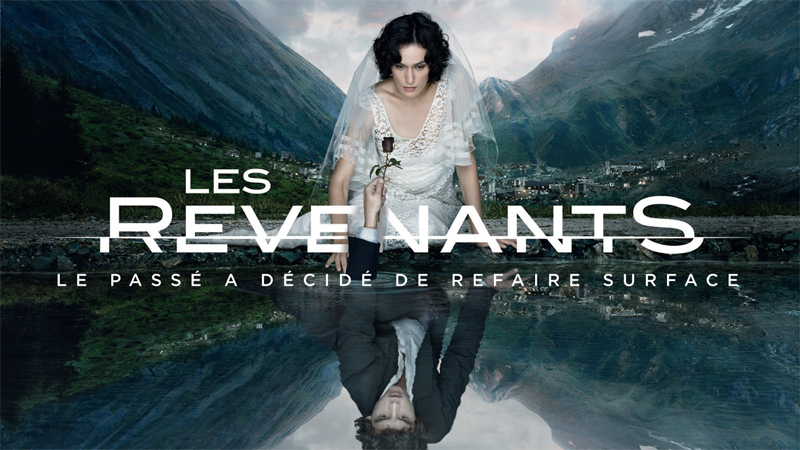In its two seasons (20 episodes), Real Humans follows two families and their respective members’ relationships to the hubots in their lives, as well as a ragtag band of liberated hubots, who have gained free will and have managed temporary escape from their lives of service. They work to gain their freedom, but are opposed by an ever-growing anti-hubot movement that calls itself “Real Humans.” Like the best science fiction, Real Humans is nuanced, thought-provoking, and poses prescient questions about the consequences humanity risks when allowing technology to serve so many functions in our lives.
The Returned (France)
In a mountain town in rural France, five dead members of the community come back to life in The Returned, a French drama with one eight-episode season under its belt and another in production. The Returned isn’t a tale of brain-dead zombies feasting on the living. These returned people don’t remember having died. They are not out to wreak havoc or eat brains. Their motivations are as myriad as their living counterparts, which is to say governed by a desire to be loved and accepted by the people they love and accept.
If this story sounds familiar, it’s because it has been told in many incarnations in the last decade -- including ABC’s Resurrection and a forthcoming The Returned adaptation from A&E -- but it is hard to imagine anything topping this atmospheric slow burn of a series. The Returned is beautifully directed with stunning visuals of the French countryside. It yields powerful performances from its ensemble cast, and is thematically underscored by a haunting soundtrack from Scottish post-rock band Mogwai.
Borgen (Denmark)
If you miss The West Wing or are still lamenting the cancellation of short-lived British drama Party Animals, then Borgen is the show for you. Focused on the unexpected rise of the first (fictional) female prime minister of Denmark, this political drama masterfully straddles the line between realistic and idealistic, while also exploring the sometimes impossible balance between professional and private spheres.
Though Borgen’s story is led by Prime Minister Birgitte Nyborg, it is a true ensemble show. Its cast of well-drawn characters expands the world of political machinations to its many corrupt and complicated parts, from the various Danish political parties to the TV newsroom. With three seasons (30 episodes) already produced, the world of Borgen has so much to offer and will have you caring about Danish politics more than you ever thought possible.
Black Mirror (U.K.)
Garnering comparisons to classic TV anthology series The Twilight Zone, Britain’s Black Mirror has already made serious waves in the U.S. Its episodes explore the dark potentialities of our technology culture, a.k.a. the “black mirror” of our many screens. Each installment features an entirely different setting, premise, and cast. This non-traditional format may stretch the definition of what it means to be a TV series, but it’s too good not to include on this list.
Black Mirror is at its best when it examines large questions through an intimate lens, such as in “Fifteen Million Merits,” one of the series' best episodes, which tackles the topic of entertainment shows like American Idol and the culture of distraction of which they are a part. “Bing” Madsen is our gateway character for the episode, a 20-something bored by his everyday existence: generating power by cycling on an exercise bike for hours on end, perpetually bombarded by distraction in the form of ubiquitous screens. When he meets Abi, a beautiful girl he hears singing in the bathroom, Bing uses most of his merits to give her a chance to audition for TV talent show Hot Shots. What happens next is a comment on the dangers of accepting distraction without question, and the range of choices we are given and make in a world where even anger can be commoditized.
In the Flesh (U.K.)
Many contemporary TV shows and movies use apocalypse as a theme, but British drama In the Flesh is concerned with what happens after the zombie apocalypse, expertly applying a supernatural filter to the real life horrors of social intolerance and discrimination. The show is set in post-zombie Britain, where scientists have found a way to “cure” the undead with medication. In the pilot, protagonist Kieren Walker, a partially-deceased syndrome (PDS) sufferer, returns to his family and rural community for the first time following his death and “rising.” The show follows Kieren’s struggle with his own guilt over the people he ate in his “untreated” state, as well as his efforts to reacclimate both to a family still dealing with his death and a town stuck in survival mode.
In the Flesh has run for two seasons, with the fate of its third yet to be announced by Britain’s BBC Three. It would be a shame to lose a TV series about the complexities of how we deal with trauma at the individual and societal level. But, even if it isn't renewed, In the Flesh is still well worth a watch.


